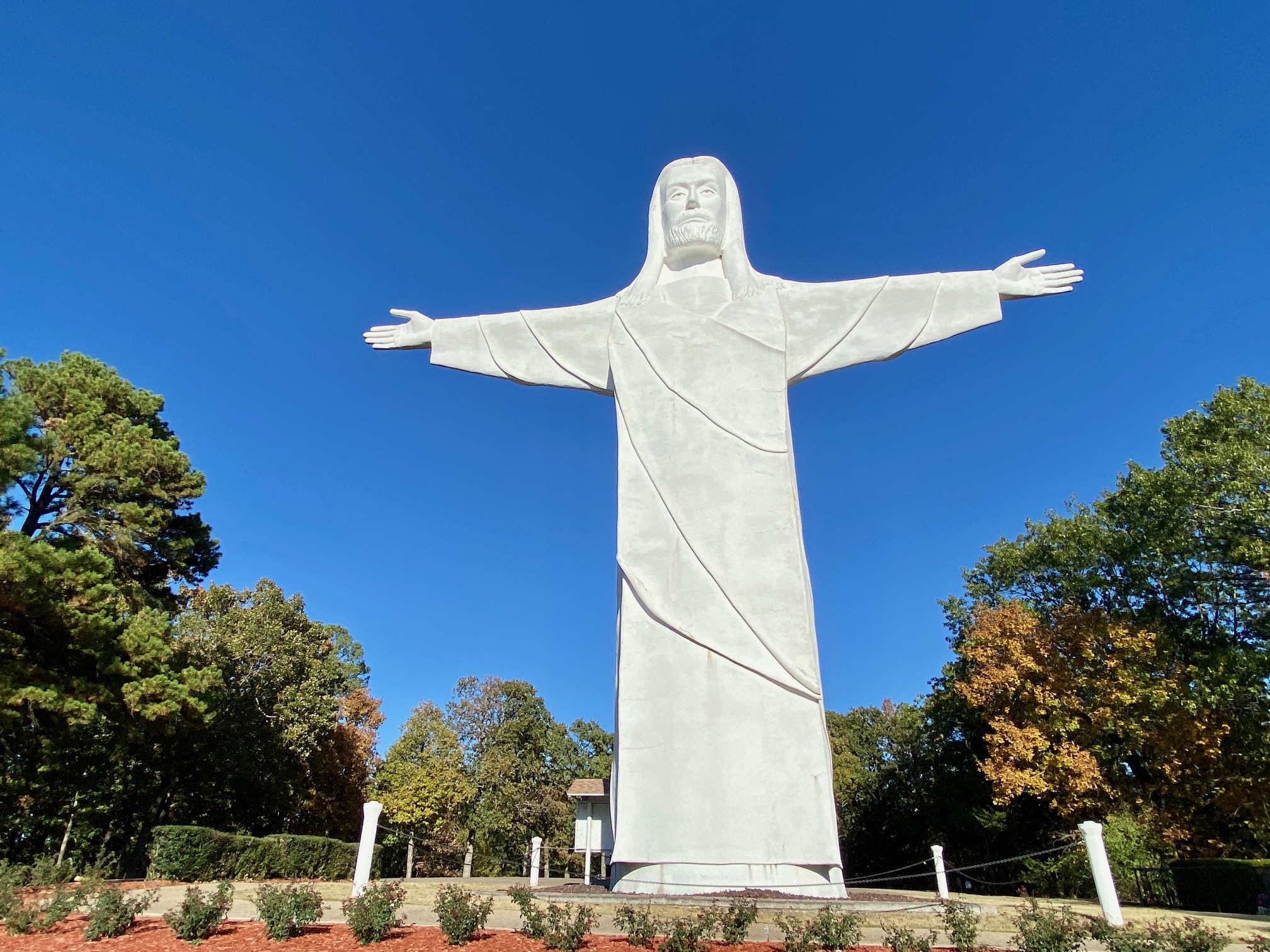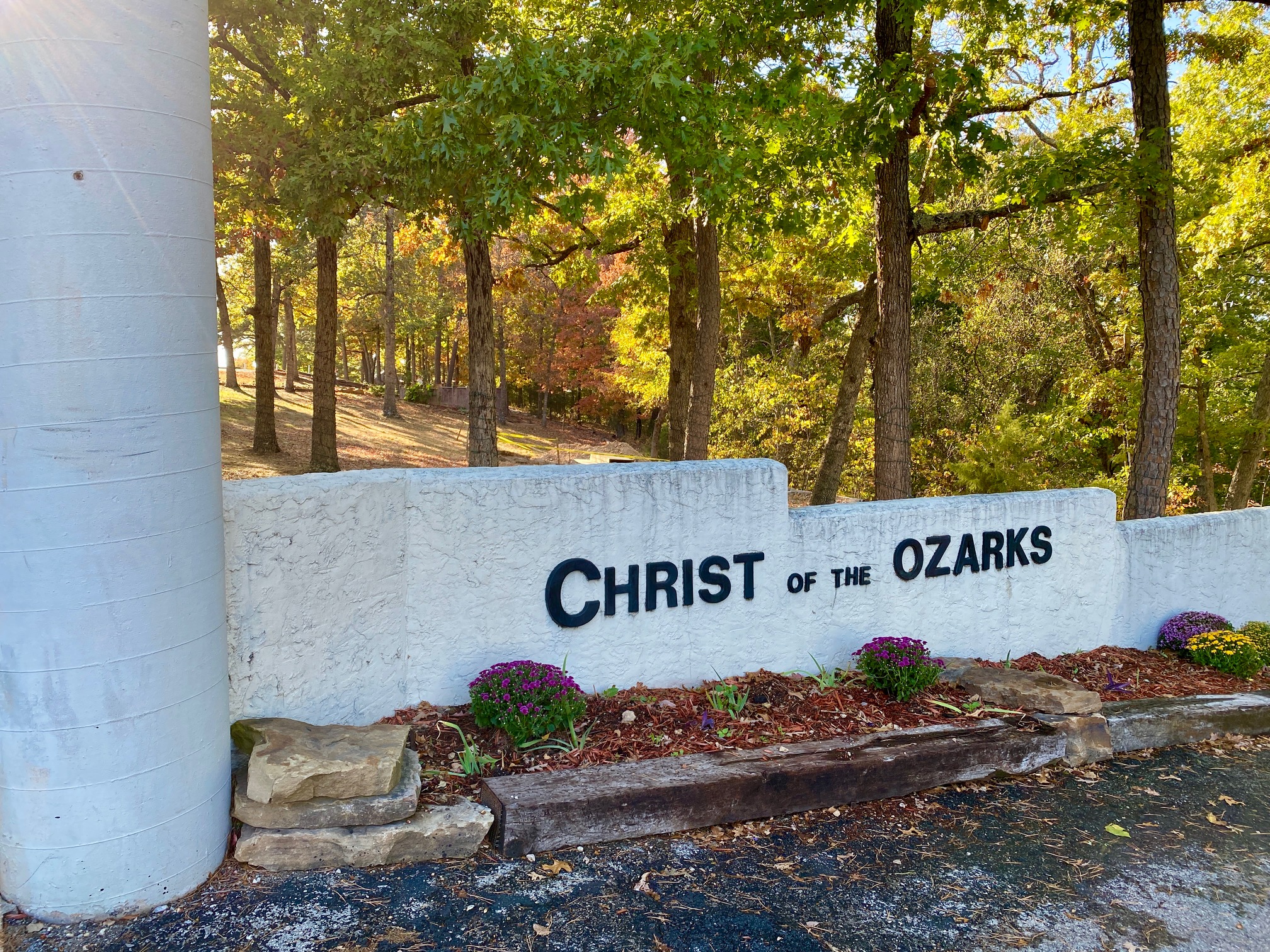
What could be the largest statue of Jesus in the country, maybe the world, standing 67-feet tall, resides in Eureka Springs, Arkansas, in a park called Passion Play: Glynn Wilson
Secret Vistas –
By Glynn Wilson –
EUREKA SPRINGS, Ark. – You never know what you’re going to find until you find it.
Mark Twain once said “travel is fatal to prejudice.” But prejudice is not my problem.
The Bible says the love of money is the root of evil, but that’s not my problem either.
“The lack of money is the root of all evil,” Twain once wrote, and I think he is more right than wrong, especially if you are doomed to live in a capitalist country like this one.
The lack of money causes some people to steal and kill. The two worst commandments.
According to more ancient, intellectual folk, there are other names for the three main roots of evil: The three unwholesome mental states of greed (rāga), hatred (dveṣa), and delusion (moha).
As I sit in an open field plugged in to power surrounded by a hillbilly-hippie concert venue called The Farm, 160 acres bordering the 1.5 million acres making up the Mark Twain National Forest in Missouri, a stone’s throw north of here, I’m feeling a little like Twain felt in the 20th century.
“The 20th Century is a stranger to me,” he wrote in his Notebook once. “I wish it well but my heart is all for my own century. I took 65 years of it, just on a risk, but if I had known as much about it as I know now I would have taken the whole of it.”
Some days the 21st century feels like a stranger to me. The last half of the 20th century was just fine, even a few years into the 21st, until I turned 50 and things seemed to go down hill from there. I turned 67 this week, and I’m thinking of visiting Wood Creek Tavern near Aspen, Colorado. But that may have to wait until next Spring.
Now the world is full of evil, wracked by greed, full of hate and misled by delusion on such a scale that no one in the 20th century could have predicted how bad it would get. I blame Donald Trump and Facebook, while trying to use Facebook for good. It’s not really working anymore, thanks to the bots, who are trying to learn how to take over the world – and no one even seems to want to slow them down, much less stop them.
We celebrated the coming of the internet back in the 1990s. Now we sometimes wish the entire thing would crash and burn, then maybe at least some people would think for themselves again.
But then again it would be sad to see it go, and a major tragedy if hackers were to successfully wipe out the past 30 years of history by taking down the Internet Archive.
The hacker attack was compared to the burning of the Library of Alexandria, the sprawling repository of knowledge in ancient Egypt that writers of the time claim Julius Caesar accidentally set on fire and burned.
Well, there are those with a growing influence on these times who would also close all the libraries and burn all the books, or bury them in a landfills, save one.
This has me thinking about “The Book of Eli” starring Denzel Washington.
It’s the end of the world and only he possesses the One Book everyone is trying to find.
Here I am at the end of the world, and the only thing I am missing is my camp chair, which I left back in Trumann, Arkansas before embarking on this trip.
The question I keep asking myself is: Could I possibly live here?
Or should I keep moving on?
There are several things to recommend Eureka Springs, a touristy little town in the Ozark Mountains, including access to cheap tobacco and legal cannabis just across the state line in the “Show Me” state. There seem to be lots to do for entertainment here, but I need to get my eyes checked and my glasses updated before spending much time driving in the mountains after dark.
Arkansas claims to be “the Natural State,” almost an inside joke for the Dead Heads and Day Trippers who found this place sometime back and simply decided to park their RVs and old school buses here and quit running.
If I was on the road in a big bus with a rock band, this would seem to be a good place to stop. But I am not. I’m just a traveling writer who could not find home where I came from, so I seem doomed to keep on moving on trying to find it.
We will not be able to find the answers to these questions today. It’s time to pack up and hit the shower and move on down the road, like the band Kansas once sang.
“When I hit those white lines, I’m gonna be gone like a Greyhound down the road.”
When I find answers, I will try to pass them on – if the internet connection holds, and the hackers and bots don’t take us down.

What could be the largest statue of Jesus in the country, maybe the world, st anding 67-feet tall, resides in Eureka Springs, Arkansas, in a park called Passion Play: Glynn Wilson
___
If you support truth in reporting with no paywall, and fearless writing with no popup ads or sponsored content, consider making a contribution today with GoFundMe or Patreon or PayPal.
Before you continue, I’d like to ask if you could support our independent journalism as we head into one of the most critical news periods of our time in 2024.
The New American Journal is deeply dedicated to uncovering the escalating threats to our democracy and holding those in power accountable. With a turbulent presidential race and the possibility of an even more extreme Trump presidency on the horizon, the need for independent, credible journalism that emphasizes the importance of the upcoming election for our nation and planet has never been greater.
However, a small group of billionaire owners control a significant portion of the information that reaches the public. We are different. We don’t have a billionaire owner or shareholders. Our journalism is created to serve the public interest, not to generate profit. Unlike much of the U.S. media, which often falls into the trap of false equivalence in the name of neutrality, we strive to highlight the lies of powerful individuals and institutions, showing how misinformation and demagoguery can harm democracy.
Our journalists provide context, investigate, and bring to light the critical stories of our time, from election integrity threats to the worsening climate crisis and complex international conflicts. As a news organization with a strong voice, we offer a unique, outsider perspective that is often missing in American media.
Thanks to our unique reader-supported model, you can access the New American journal without encountering a paywall. This is possible because of readers like you. Your support keeps us independent, free from external influences, and accessible to everyone, regardless of their ability to pay for news.
Please help if you can.
American journalists need your help more than ever as forces amass against the free press and democracy itself. We must not let the crypto-fascists and the AI bots take over.
See the latest GoFundMe campaign here or click on this image.
Don't forget to listen to the new song and video.
Just because we are not featured on cable TV news talk shows, or TikTok videos, does not mean we are not getting out there in search engines and social media sites. We consistently get over a million hits a month.
Click to Advertise Here
















Best Wishes for safe travel and winter in a warm location.
Your thoughts in ways echo my own. I traveled by RV for seven years before abandoning the nomadic life last year and settling back in my hometown of Kansas City.
While Kansas City is certainly having a moment, and rapidly overtaking and passing its 1950s and 1960s inferiority complexes, it is still a very small place in a very large country.
I long to again wake up on the high plains of Kansas, near the water on the Olympic Peninsula, or at any of the hundred places I could once, at least temporarily, call “home.” I decided to stop, and I truly wish I hadn’t.